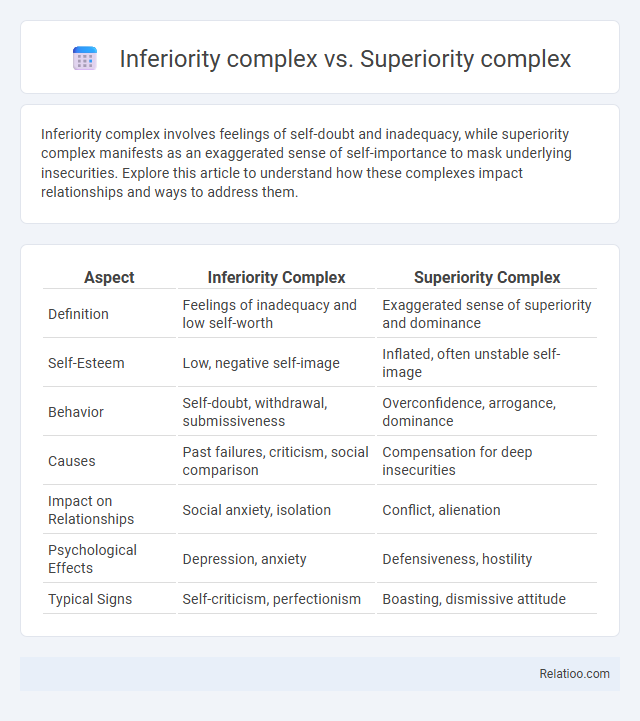Inferiority complex involves feelings of self-doubt and inadequacy, while superiority complex manifests as an exaggerated sense of self-importance to mask underlying insecurities. Explore this article to understand how these complexes impact relationships and ways to address them.
Table of Comparison
| Aspect | Inferiority Complex | Superiority Complex |
|---|---|---|
| Definition | Feelings of inadequacy and low self-worth | Exaggerated sense of superiority and dominance |
| Self-Esteem | Low, negative self-image | Inflated, often unstable self-image |
| Behavior | Self-doubt, withdrawal, submissiveness | Overconfidence, arrogance, dominance |
| Causes | Past failures, criticism, social comparison | Compensation for deep insecurities |
| Impact on Relationships | Social anxiety, isolation | Conflict, alienation |
| Psychological Effects | Depression, anxiety | Defensiveness, hostility |
| Typical Signs | Self-criticism, perfectionism | Boasting, dismissive attitude |
Understanding Inferiority Complex
Understanding inferiority complex involves recognizing persistent feelings of inadequacy and low self-esteem that influence behavior and emotions. Unlike simple inferiority, which may be situational or temporary, an inferiority complex causes chronic self-doubt and social withdrawal. Differentiating this from a superiority complex is crucial; the latter masks insecurities through exaggerated self-worth and dominance, whereas inferiority complex highlights underlying feelings of inferiority.
Defining Superiority Complex
A superiority complex is characterized by an exaggerated sense of self-worth and dominance used to mask underlying feelings of inferiority. Unlike a simple inferiority complex, which involves persistent self-doubt and inadequacy, the superiority complex manifests as arrogance and overconfidence. Your awareness of these complexes can help better understand behavior patterns and improve personal growth.
Key Psychological Differences
Inferiority complex involves pervasive feelings of inadequacy and self-doubt that undermine confidence, while superiority complex manifests as an exaggerated sense of self-worth and a need to appear dominant or superior to others. Inferiority reflects a basic feeling of being less capable or valuable without the compensatory behaviors seen in a complex. Key psychological differences center on the defense mechanisms: inferiority complex leads to withdrawal and low self-esteem, whereas superiority complex serves as a mask for deep-seated insecurities.
Causes and Origins of Each Complex
Inferiority complex often arises from early childhood experiences of criticism, neglect, or unrealistic expectations, leading to persistent feelings of inadequacy and low self-esteem. Superiority complex typically develops as a defense mechanism to mask deep-seated feelings of insecurity or inferiority, possibly stemming from social comparisons or unresolved trauma. Understanding these causes helps you address underlying psychological patterns and foster healthier self-perceptions.
Behavioral Signs and Symptoms
Inferiority complex manifests through persistent feelings of inadequacy, low self-esteem, social withdrawal, and sensitivity to criticism, often leading to avoidance of challenges. Superiority complex displays behaviors such as arrogance, boastfulness, defensiveness, and a tendency to belittle others to mask underlying insecurities. Inferiority involves general self-doubt and lack of confidence but may not always result in extreme behavioral patterns seen in complexes.
Impact on Relationships and Social Life
Inferiority complex, characterized by persistent feelings of inadequacy, often leads to social withdrawal and difficulty forming close relationships due to low self-esteem, while a superiority complex manifests as arrogance and dominance, pushing others away and creating social friction. Both complexes disrupt healthy communication and trust, negatively affecting your ability to build meaningful connections. Addressing underlying self-worth issues is crucial to improving your social interactions and fostering balanced relationships.
Effects on Self-Esteem and Mental Health
Inferiority complex often leads to diminished self-esteem, fostering feelings of inadequacy and persistent self-doubt that can trigger anxiety and depression. Superiority complex, while masking insecurities, can result in social isolation and heightened stress due to unrealistic self-expectations and difficulty accepting criticism. Both complexes negatively impact mental health by distorting self-perception, whereas general feelings of inferiority may cause temporary low self-esteem but are less likely to develop into chronic psychological issues.
Strategies for Overcoming Inferiority Complex
Overcoming an inferiority complex requires targeted strategies such as cognitive-behavioral therapy to challenge and reframe negative self-beliefs, building self-esteem through setting achievable goals, and fostering a growth mindset to embrace learning and personal development. Recognizing the differences between inferiority and superiority complexes helps you address deep-seated feelings of inadequacy rather than compensating with arrogance or dominance. Incorporating mindfulness practices and seeking social support can further empower you to break the cycle of self-doubt and enhance emotional resilience.
Addressing Superiority Complex Tendencies
Superiority complex tendencies often mask deep-seated feelings of inferiority, causing individuals to overcompensate through arrogance or exaggerated self-importance. Addressing these tendencies requires recognizing the underlying insecurities and fostering genuine self-awareness, which can ultimately balance your self-perception. Therapeutic strategies like cognitive-behavioral techniques help replace defensive behaviors with healthier self-confidence, reducing the need to assert dominance over others.
Seeking Professional Help and Support
Individuals experiencing inferiority complex, superiority complex, or feelings of inferiority benefit significantly from seeking professional help such as therapy or counseling to address underlying self-esteem issues and cognitive distortions. Mental health professionals employ evidence-based approaches like cognitive-behavioral therapy (CBT) to improve self-awareness, manage negative thought patterns, and foster healthy self-perception. Support groups and psychological interventions play a critical role in developing coping strategies and social skills, promoting long-term emotional well-being and balanced self-confidence.

Infographic: Inferiority complex vs Superiority complex
 relatioo.com
relatioo.com